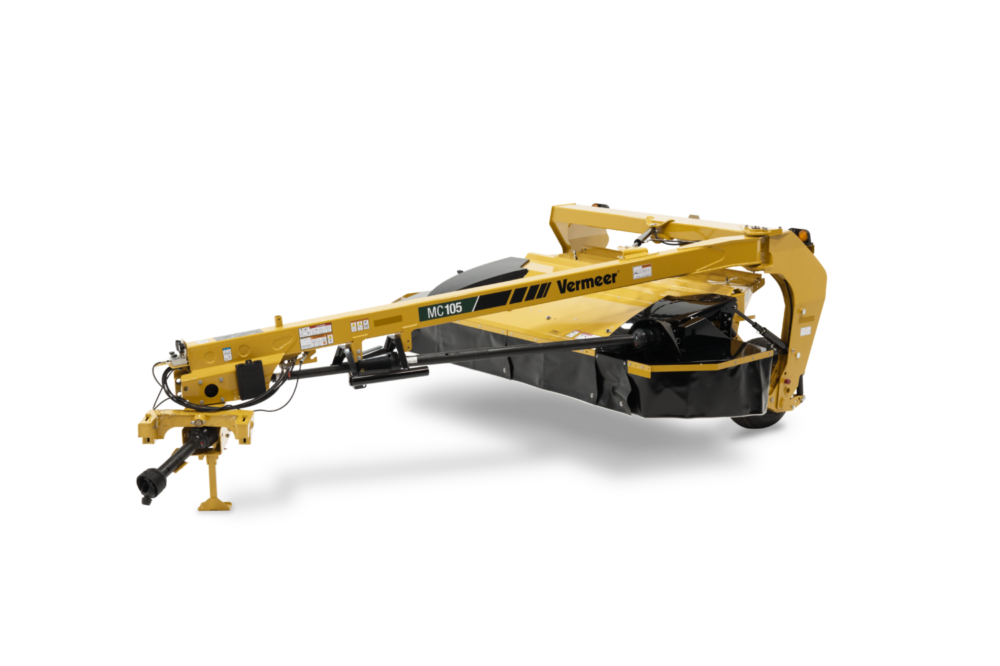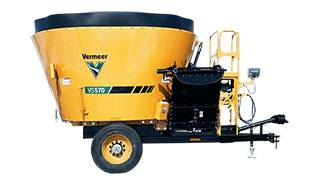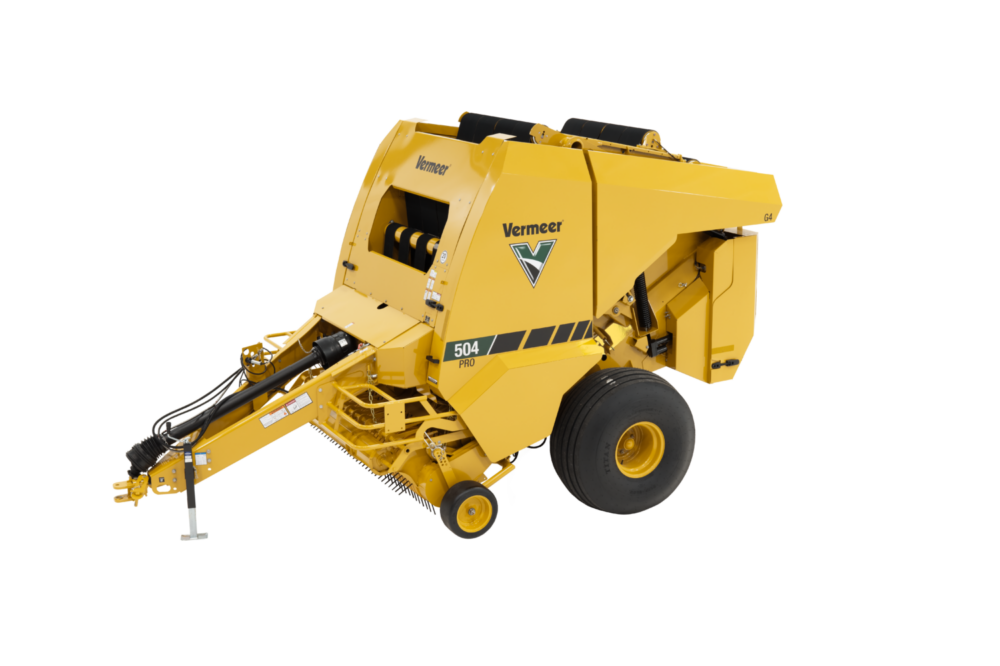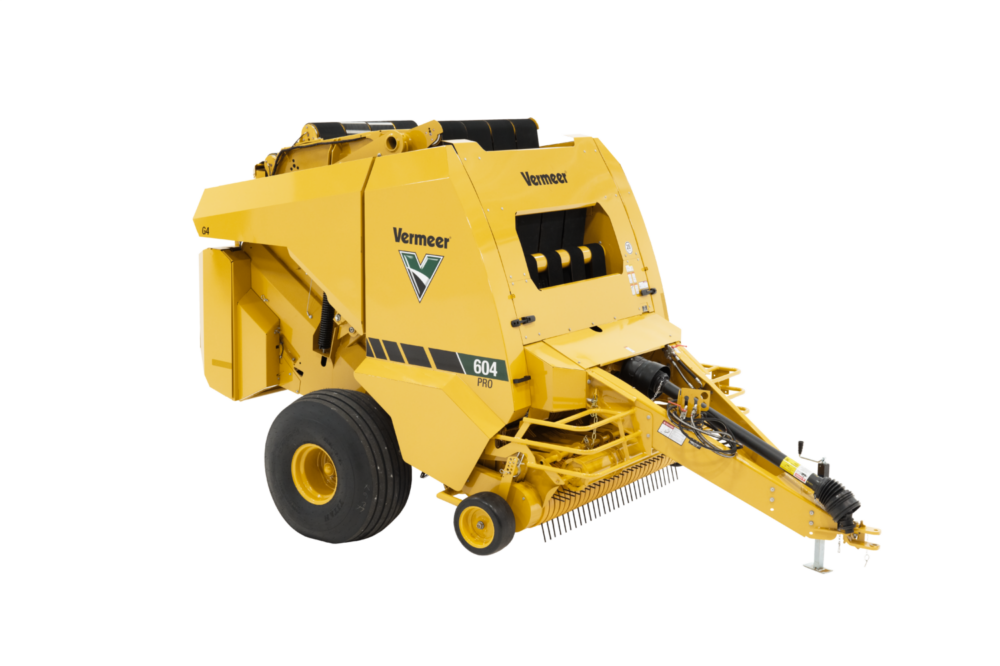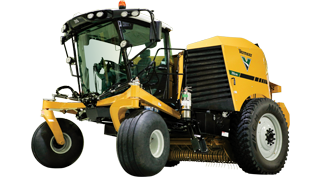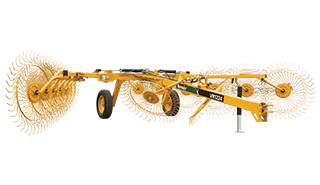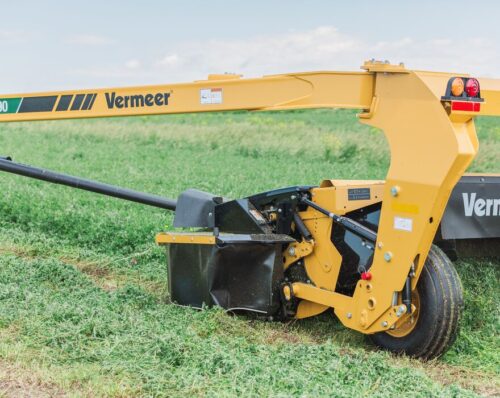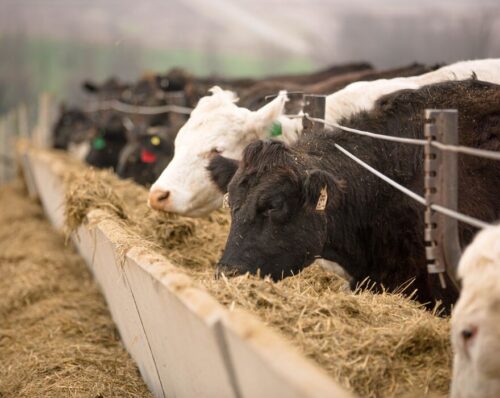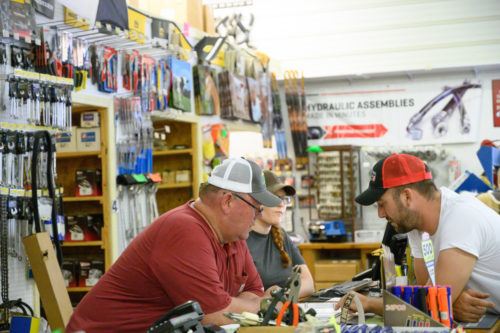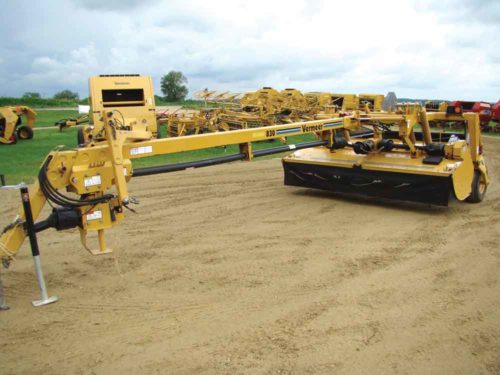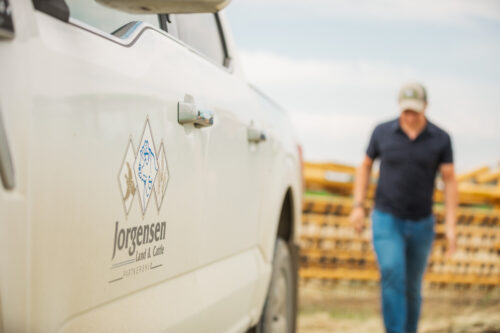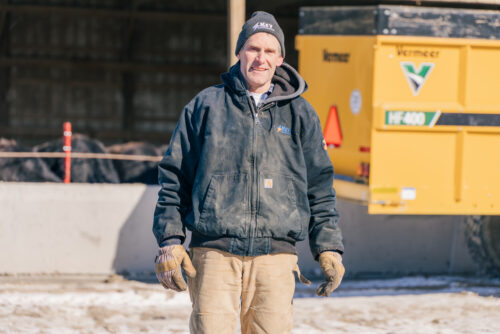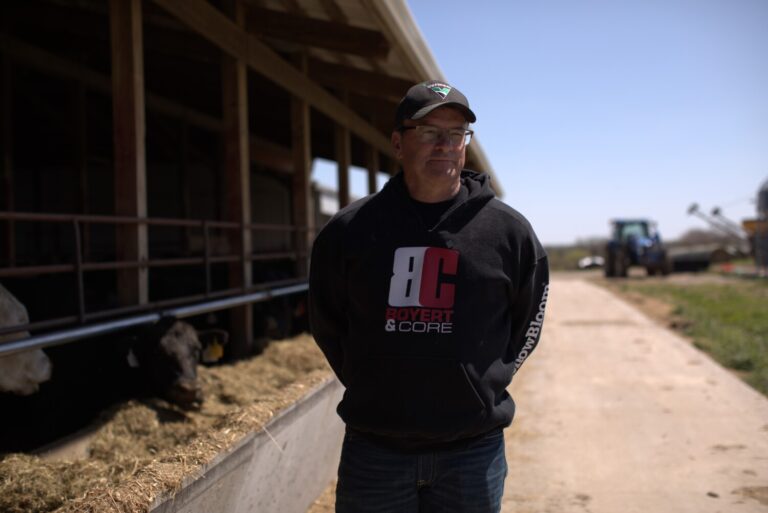
Inside Mark Core’s lifelong fascination of cattle — and Vermeer hay equipment
January 2025
The year was 1972. Mark Core was a young boy then. But the memory of this day sticks with him like the sweaty Iowa weather that afternoon.
His father, Lloyd Core, had arrived at the family’s farmhouse in Pleasantville, Iowa. You’ve got to see this, his father told the family. They piled in their old Mercury, windows cranked down.
“Because we had no air conditioning,” Mark Core recalls.
Back then, Lloyd Core baled hay with his brother, Harold, as a side hustle. They produced small, square bales — thousands upon thousands a year. But what Lloyd saw earlier that day mesmerized him.
He had to show his family.
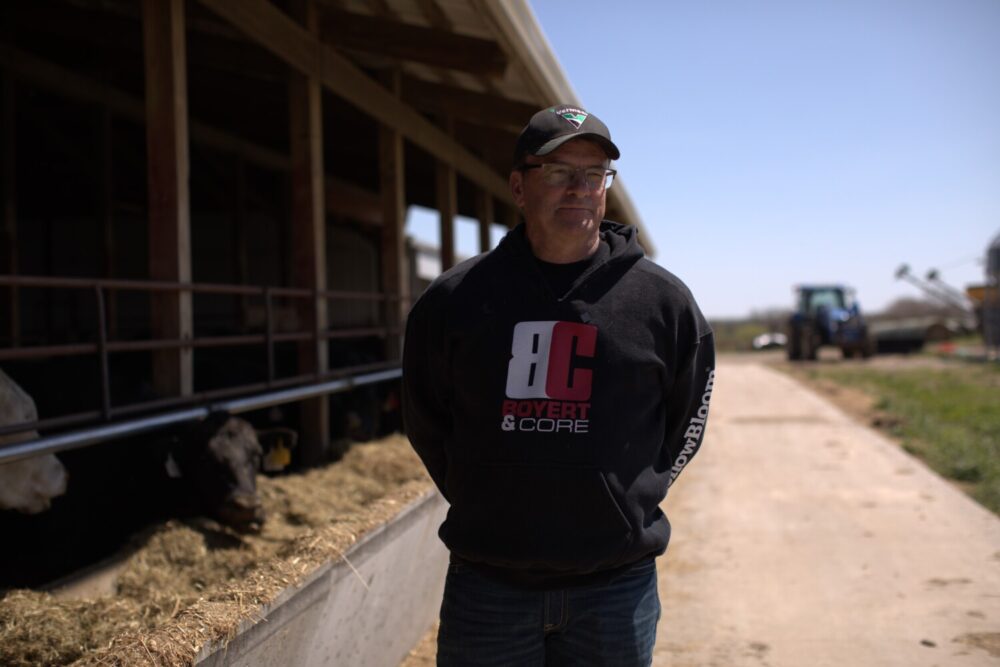
Lloyd Core drove them about a mile north of their central Iowa home. And there it was — a Vermeer round baler out working in the field. A man nearby, Pella’s Gary Vermeer, invented the first one in 1971.
“I don’t remember a lot at that age, truthfully. But I remember getting in that car,” Mark Core said. “He was so excited about it. So intrigued about it.”
The family watched out of the rolled-down windows. The Vermeer round baler collected the hay and shaped a bale in its chamber. The big, round baler bundled bales far bigger than anyone anywhere had seen before Vermeer’s creation.
As the bale was about to be ejected, Lloyd Core directed his family’s attention.
“Now watch,” Lloyd said. “It’s about to hatch an egg.”
A father’s passion for cattle passed down
Lloyd Core would never own a Vermeer round baler. But he left his son with a marrow-deep appreciation of farm life — notably the cattle business.
The family was raised on the Pleasantville farm where Lloyd bred Hereford cattle. The farm was originally purchased by Mark’s great-grandfather. The family still lives on that central Iowa farm and uses the show barn his grandfather built in the 1950s.
“I’ve got letters between my mom (Dolores) and dad when he was in the Korean Conflict, where he would want The American Hereford Journal forwarded to his address so he could keep up on what’s going on,” Mark Core said.
As Core got older, he would drive the family’s pickup while his father rode in the back and fed cattle. Mark and his older brother, Phil, showed livestock at local 4-H shows.
Not long before Mark attended Iowa State University, the Farm Crisis struck. One in four Iowa farms did not survive the 1980s.
The Core family farm was among those struggling.
His father, forever the cattleman, was left to sell his prized Herefords for the farm to stay in the family. Lloyd and brother Phil began raising purebred hogs instead to make ends meet.
“The pig industry was good and essentially helped us save the farm in the late 70’s and 1980s,” Mark said.
But like his father, raising cattle captured Mark in a way that nothing else could.
“The green grass and pastures, and the hay and forage management, and the animal husbandry and genetic selection … those are just precious moments for me,” Mark Core said. “The happiest place on Earth for me is checking cows in a side-by-side when the sun’s coming up and you smell the spring grass.”
Eventually, he would meet someone who felt exactly the same.
And she became his wife.
Her dad’s first son
Deb Core was raised in Jackson County, Minnesota. She adored farm life, helping her father in the barn and taking care of animals. Most of all, she loved cattle.
“I always said I was my dad’s first son,” Deb Core said. “I wanted to be in the barn. I wanted to be around cattle.”
Her home county in southwestern Minnesota was rural and relied on agriculture. The way of life extended to the children raised there. Jackson County’s 4-H program boasted a widely respected cattle judging team.
“In our county, every livestock kid’s dream was to make the Jackson County 4-H team,” Deb Core said.
Ron Harder was the 4-H team’s coach. He held students to high standards and a good number became judges at established college programs.
Deb was among them.
“I knew from the time I was in seventh grade that I would go to South Dakota State and major in animal science and be on the judging team,” Deb said. “I never considered going anywhere else.
“Never thought of anything else.”
A life-changing chance encounter at the Iowa State Fair
Mark’s late brother, Phil, graduated from college first and began buying cattle here and there.
In late 1984 as Mark attended Iowa State, his father Lloyd died. As a college student, Mark stayed connected to the family farm. It was during this time he competed for the Iowa State judging team, including the school’s national championship squad in 1986.
“That’s how my passion for livestock evaluation and cattle judging started,” he said.
Core began working in sales for Syntex Animal Health after graduation and helped Phil build their cattle program at Core Farms.
Meanwhile, after graduating from South Dakota State, Deb obtained her master’s degree from Colorado State. While there, she served as the assistant coach on the CSU judging team. Life was exactly as she planned as a kid.
She moved to Iowa when the Iowa Beef Expo hired her as its executive director. Around this time, Deb started livestock judging again, working at county fairs in the state.
Her new job brought her to the Iowa State Fair in 1991. At the fairgrounds in Des Moines, she walked past a man in his late 20s.
She didn’t notice him.
But he noticed her.
“She doesn’t know it yet,” Mark Core told his friend as they walked past Deb, “but she’s going to marry me.”
A love for cattle — and soon each other
Mark Core didn’t need long to make good on his boast.
Mark and Deb began dating that fall and were engaged four months later, on March 1, 1992. They married in September that year and raised two daughters, Bailey and Kennedy, on their Pleasantville farm.
Bailey and Kennedy showed cattle as kids, and their parents mentored dozens of other children. They loved the lessons livestock showing taught and the work ethic it instilled.
“I truly believe that God gives each of us as parents different tools to raise our children,” Deb Core said. “You know, your tools may be different than my tools.
“He gave us cows and livestock.”
The Cores started judging together and earned a reputation as top-end livestock judges. They judged young exhibitors the way they wanted their daughters to be treated when they showed.
Their opportunities grew. Between them, the Cores judge about 20 shows a year.
The San Antonio Livestock Show and Rodeo. The National Western Stock Show and Rodeo. Houston Livestock Show and Rodeo, North American International Livestock Exposition, The Fort Worth Stock Show and Rodeo. State fairs. County fairs. Jackpots.
Name the show, and they have probably judged it.
That list includes the American Royal in Kansas City, where Deb became the first woman to judge its famous steer show in 2023. The Cores will also judge at The Showtimes Magazine Blackout Jackpot 9 this winter in Loveland, Colorado. Vermeer is sponsoring the judging and combine.
“If you’re going to be in this business long-term, whether it’s trying to sell cattle or whether it’s to have opportunities to judge livestock shows, you have to have the character and integrity to earn that privilege,” Deb said.
“It is an honor and a privilege to be asked to do that.”
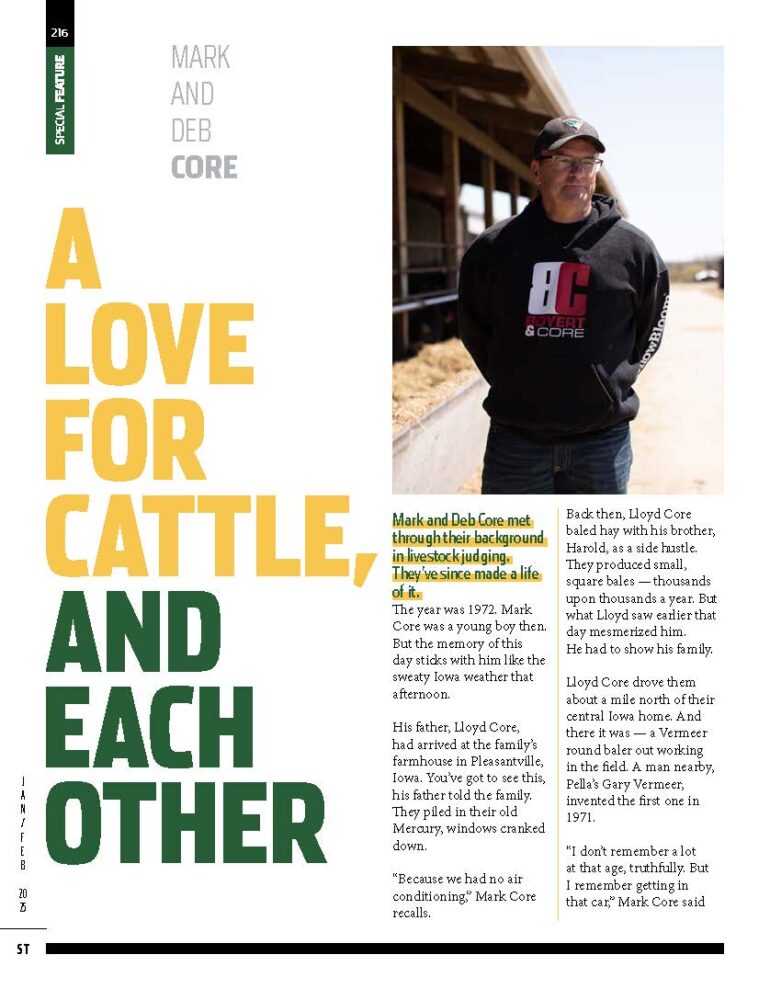
A legacy at Vermeer and on the farm
Core Farms, after decades of toil and years of heartbreak, was on a roll by the 1990s. In 1996, they were named National Maine-Anjou Breeder of the Year.
“Mark didn’t have a chip on his shoulder. He wasn’t blaming anybody for anything,” Deb Core said of her husband. “He and his brother, Phil, were just willing to put their heads down and grind it out and figure out a way to keep the farm.”
That same year, Mark took a new job at Vermeer Corporation. Nearly 30 years later, he’s still there.
Over the years, Core Farms has become Boyert-Core Show Cattle. Bailey and her husband, Jared Boyert, now head the day-to-day operations. If you visit the farm, you’ll see Vermeer equipment — a vertical mixer, mower conditioner, tedder, rake, bale processor and, yes, a Vermeer round baler.
“We are all Vermeer,” Mark Core said.
Recently, Deb took a walk with her granddaughter, Sloan, at the family farm. Sloan was about to show for the first time at the North American International Livestock Exposition.
She’s the same age, five, as Bailey was when she first showed cattle.
“Sloan, three days until you get to go to Louisville,” Deb recalled saying to her grandchild.
Sloan was eager. She looked at her grandmother.
“Grandma, I’m so lucky to live on a farm,” she said.
Mark works at the family farm when time allows. Along with the always-present cattle duties, he mows hay and repairs equipment. He’s forever a cattleman at heart.
All that has helped Core at Vermeer Corporation.
“I feel the pain of a customer,” said Core, an executive vice president and chief marketing officer at Vermeer since 2015. “‘How do I contact a dealer when I’m busy at work for a part? Or do they have the part? Or the stress of a Saturday afternoon, running into a rock or having a breakdown – Can I get it repaired?'”
Here’s one last story Core recalled.
It’s about a boy, but the boy is not him this time. This child in this story is the great-grandson of Gary Vermeer.
It takes place on the Core family farm, where so many of his favorite memories have taken place. After a morning of hard work, Core and the boy plunked down on 5-gallon buckets and ate lunch.
“He was so interested in everything,” Core said.
The boy, perhaps 10 then, gazed up. He marveled at the show barn that Core’s grandfather built so many years ago.
“Mr. Core, why are these barns so tall?” the boy asked.
Mark thought about it and realized the answer.
“Well, until your great-grandfather invented the round baler, that’s what all the hay was stored up in,” Core replied.
Core, who once gazed out from his family car as a Vermeer round baler hatched an egg, could understand the boy’s wonderment.

